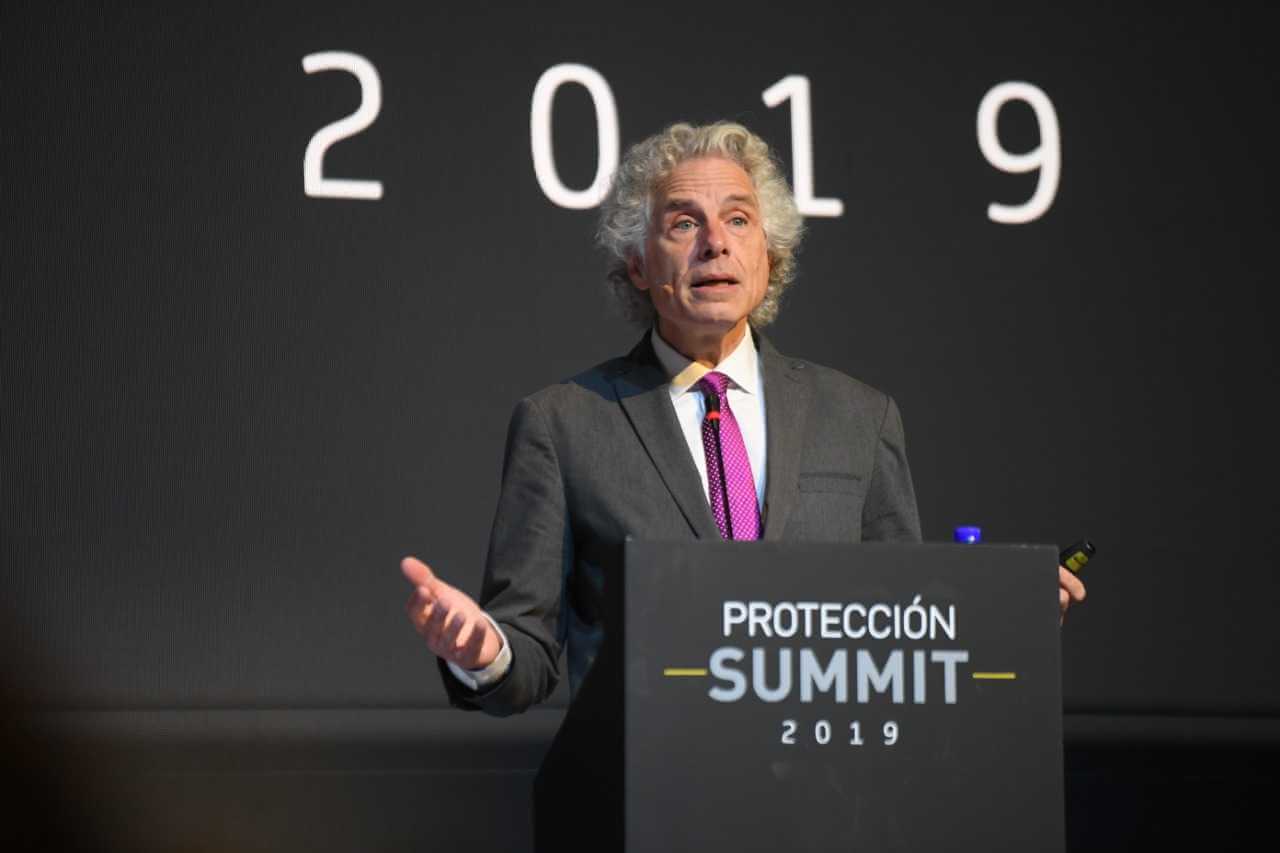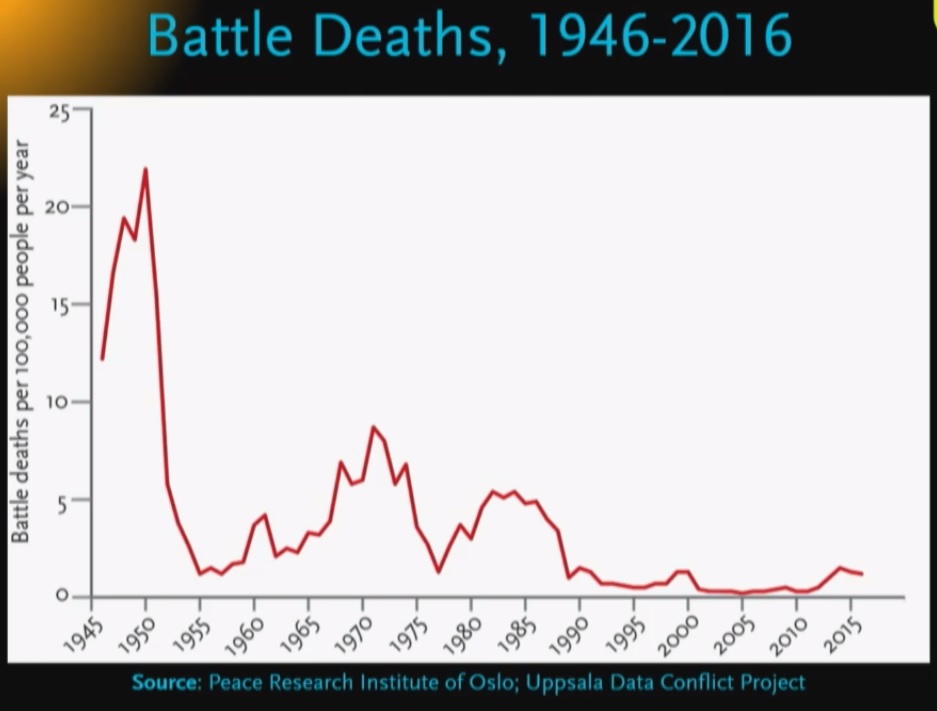He speaks many truths, but on matters of war and peace, professor Pinker has his work cut out for him
The world is a less violent place, and food is more plentiful. People are generally healthier, smarter and happier than they’ve ever been – and live longer, too. The rise and spread of democracy has given a great mass of people rights and freedoms that we are now so accustomed to that we take them for granted. We are wealthier than we have ever been in history, and growing masses of us have more disposable income than ever before.
That is the message that Steven Pinker, world renowned cognitive psychologist, linguist, author and Harvard professor, brought with him when he spoke at an event in Bogota last week. He came to the Colombian capital to speak about the concepts in his 2018 book ‘Enlightenment Now: The Case for Reason, Science, Humanism, and Progress’.
To the uninitiated, he sounds like a naïve, wild-eyed optimist at best, or at worst, woefully ignorant of the cold realities of the world.
But Steven Pinker is no fool. He is acutely aware that his critics and detractors, particularly those on the Left, revile him for his ideas. But he nonetheless stands tall in the intellectual community and is able to draw standing-room-only crowds in the far reaches of the world such as here in Colombia.
How is this possible? It is because all that he says – no matter how naïve or wishy-washy it may sound to you, is grounded in solid data. That’s right: Professor Pinker forces you to reassess your world view, and he’s made a name for himself by changing your mind.
Perhaps we’re all not going to hell in a hand basket. Maybe the end is not-so-nigh.
While his brand of optimism may not be in fashion, the notion that we’re doing better now than we ever have before is a demonstrable fact, and professor Pinker has the data to prove it. The sureness and authority with which he speaks has made his critics froth at the mouth.
“Steven Pinker’s Enlightenment Now is a manual for liberal self-congratulation. This preening tome professes a pragmatic and quantitative approach to the world’s problems,” the socialists at Jacobin magazine seethed with naked contempt at Pinker’s audacity to claim human progress has been made.
This is unsurprising. It may be that the Enlightenment ideas of democracy, declarations of human rights, markets, truth-seeking academies, scientific societies, and a free press lauded as drivers for human progress in Pinker’s book run counter to the Marxist notion of class struggle, and the overthrow of the bourgeoisie by a revolutionary proletariat.
But Pinker has a lot of time for his critics. Rigorous discussion and debate, after all, make up one of the fundamental tenets of human reason.
Related: ‘Symbols Are Important, But So is Reality’
“Two-hundred and fifty years later, how did that Enlightenment thing work out?” the professor wondered aloud during his talk at the Cubo Colsubsidio building on Tuesday last week. “If you believe as most intellectuals, most critics, and professors, and social commentators, the answer is not very well. Most intellectuals hate progress. And intellectuals who call themselves ‘progressives’ really hate progress.”
He went on: “If you think we can solve problems – I have been told – that means you have a blind faith and a quasi-religious belief, in the outmoded superstition of the false promise, of the myth, of the onward march of inevitable progress. You are a cheerleader for vulgar American ‘can-doism’ with the ‘rah rah’ spirit of ‘boardroom ideology’, of ‘Silicon Valley’ and the Chamber of Commerce.”
Professor Pinker’s retort to these criticisms is always the same: “Let’s take a look at the data.”
And break out the data he does. Pinker proceeds to demonstrate how human life expectancy has gone way up, child mortality, mothers dying at child birth and death from infectious disease have gone way down globally, even here: “In Colombia today, the life expectancy at birth is 74 years,” he said.

By most metrics, humans have progressed immensely and are better off now than they have ever been in history, thanks to things like industrialization, more efficient food production, medicine, commerce, peace and democracy, professor Pinker argues.
The stats of our march onward and upward continue, as do the charts full of arrows pointing upward and to the right: Calorie intake is as high as it’s ever been, famine at the lowest levels in ever (except in war-torn regions, where it’s difficult to safely deliver food to the desperate population), and globally, poverty and extreme poverty are way down.
And, of course, there is financial prosperity as high as it’s ever been in human history – as a result of education, capitalism and social spending. “Colombia’s GDP per capita today is $13,000 American dollars. Thirty years ago, it was about half that, $6,600 dollars, so Colombian prosperity has doubled in a generation,” Pinker said.
He opened the portion of his talk about war and peace with stats and factoids showing how the old empires of Europe were almost always at war with one another, and times of peace were just interludes between wars. Today, the modern liberal democracies that grew out of those old imperial powers are almost never at war.
With the exception of WWI and WWII – in which massive numbers of people were killed – deaths related to wars have been steadily declining in the latter half of the 20th century and the first decade of the 21st century.
“The rate of deaths from all wars (after WWII), from civil wars, and colonial wars and inter-state wars has fallen from 20 battle deaths per 100,000 per year to less than one battle death per 100,000 per year. This is a result of the spread of democracy – because democracies are less likely to fight each other – and the spread of commerce, because countries that trade with each other are less likely to go to war,” Pinker said.

Battle deaths may be way down, as Pinker contends, but modern wars are no longer fought using large armies facing off against one another on the battlefield.
He even went so far as to cite Colombia’s 2016 peace agreement, or what’s left of it, as further evidence of the steady decline of the fatality of war, and how the world is therefore safer now than it has ever been.
“This, of course, is obvious to people especially in this country, with the signing of the peace agreement between the government and the FARC put an end to the last war in history. For the first time in history, an entire hemisphere of the globe is freed of war as it is strictly defined, and the last that came from the Cold War.”
Steven Pinker’s Narrow Definition of War
Sadly, this is where Pinker’s signature powers of persuasion come to a screeching halt. It is easy, and perhaps self-serving, to argue that the deaths associated with war are in decline, when what you believe constitutes a war is based on the narrow and misleading metric of “battle deaths per 100,000 per year.”
This view of war envisions a confrontation between two rival armies squaring off against each other, hurling lead and explosives and fire and death at one another in a bloody attrition until the army with the fewest dead wins. This outdated view of warfare may have been true for WWII and the wars before it, but it is hardly how wars are fought today.
All the other sources of death and misery typical of modern war – the massacring of civilians, ethnic cleansing, forced displacements, refugee crises, terrorist attacks, the shelling and airstrikes and the gassing of people in undefended cities – presumably don’t count as “war” in Pinker’s definition, as none of those things are “battle deaths.”
One wonders how the numbers would change, and how the above chart might look, if Pinker bothered to factor into his war metrics something as tertiary as famine. People starve to death as a result of war – in Yemen and Syria, for example – and he admitted as much earlier in his talk, when he said: “Today (famines) do not take place because of a shortage of food, but because food can’t get to war-torn regions.” Yet again, this lethal consequence of war doesn’t make the grade, and as a result we can all go on believing we are safer and more secure.
That Pinker had the gall to bring up the FARC peace agreement as some kind of success story in humanity’s march toward progress shows the depth of his ignorance about what peace is.
Can we take seriously his notion that the peace deal “put an end to the last war in history” when political killings in the country actually increased after the peace deal was signed? He didn’t seem to be aware that he was heralding the progress of peace in a city where a suicide bombing killed 22 people, just nine months before he parachuted into Colombia and uttered those lofty words.
The idea that Colombia’s peace accord brought with it “an entire hemisphere freed of war” may be true by Pinker’s definition. But it rings hollow when we glance around the continent and see Ecuador, Chile and Bolivia burn with social and political strife, and a growing diaspora of Venezuelans streaming out of their crumbling country in all directions, precipitating the largest refugee crisis Latin America has ever seen – one that is on course to surpass that of Syria’s.
Other aspects of human progress are undeniable, and professor Pinker is right to point them out and to commend what we as a species have been able to achieve. But when it comes to war and peace, the conclusions he has reached from bad data and faulty metrics are not just regrettable, they’re dangerous.
They allow him and the people he has convinced to look at all of the conflict, killing and misery in the world as aberrations – mere hiccups and bumps that can be white-washed over – as peace spreads and the world grows safer.
It’s a shame that Steven Pinker, who is a tower of intellect in so many other regards, hasn’t figured out that peace isn’t merely the absence of war.

Journalist. Misfit. Malcontent. Provocateur. Is a better Colombia is possible? We’re starting to have doubts.


You are so correct. The ruling elites don’t need war if their absolute power secured by a high level of repression against their own people cannot be challenged. Why should they get greedy and invade their neighbors when all they have to do is make a deal with the mafia leaders of their neighboring countries to divide up the turf. The US enforced world order since WWII has maintained this status quo in the less developed world. In that regard, I highly recommend to you this book: Disunited Nations: The Scramble for Power in an Ungoverned World by Peter Zeihan
Thank you kindly for the book recommendation Michael. I’ll check it out.